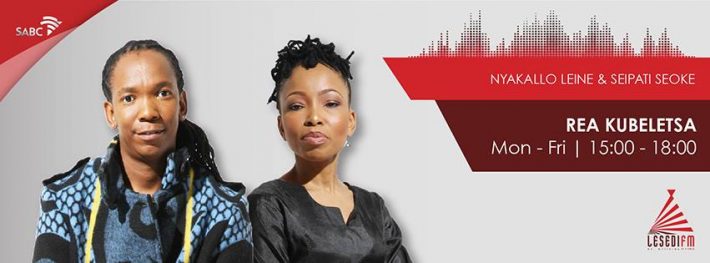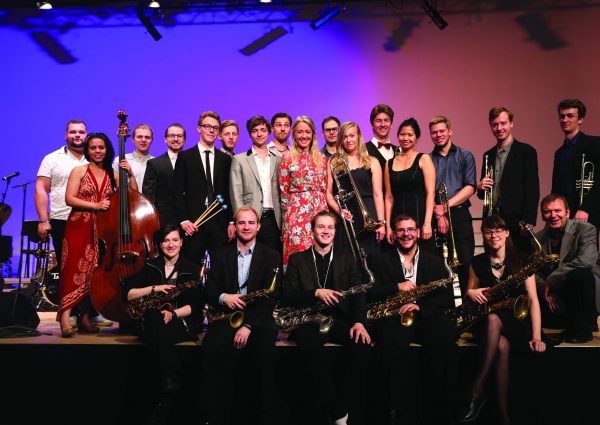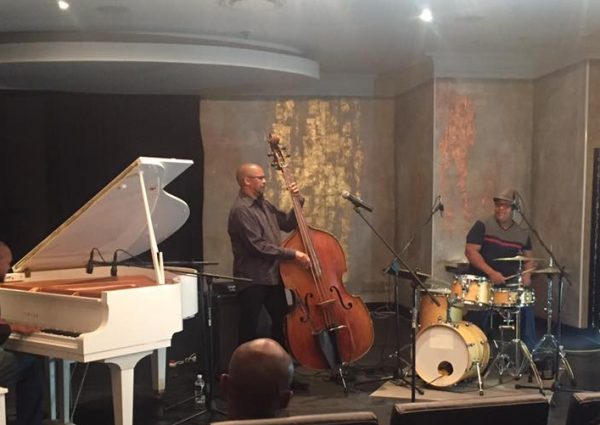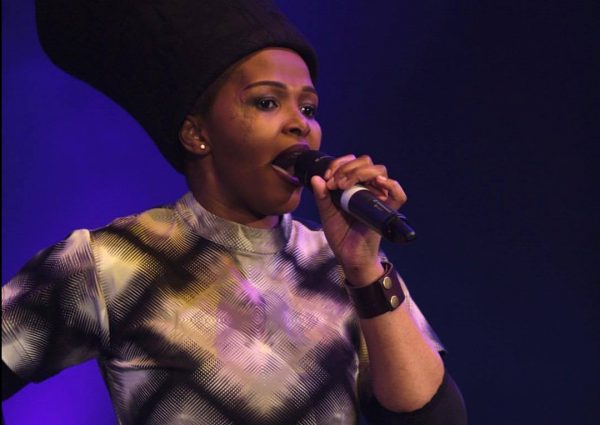“If Twasa is the enthroned renaissance princess, Ba2Cada is a commoner who rose through the ranks of the radio movement, every step of the way, until his national call-up,” writes Ace Moloi.
On your marks…
He comes in with the pace of a watchtower who has seen the enemy, but was failed by his horn and therefore has to deliver the warning sound personally. It’s the kind of enthusiasm we’ve come to know horseracing commentators of, and with radio being the theatre of the mind, you imagine him on a treadmill: running yet stationary. When this voice blares on your home theatre system, it rewinds your day so that you’re as fresh as the morning sun. If you’re driving it feels as if your skills are under scouting by makers of the Fast & Furious, and the only way to make the cut is to rise above the rest—literally.
His name is Nyakallo “Ba2Cada” Leine, the reigning DStv Mzansi Magic Radio Personality of the Year as per viewers’ choice.
Right after his first link – which could amount to a full minute if he were as shuffling as the legendary Phelane Sothoane – comes in a sharp voice that can do just fine by itself, without a microphone. But it’s now a bit mature: definitely not the young girl’s accent that my mother praised to her grave. Its maturity is a combined result of the diverse audiences it has spoken to—on air (afternoon drive and night time radio), on TV (Jam Alley), in the recording studio (music albums) and in church activities (preaching).
She’s popularly known as Twasa (Seipati Seoke) and this show that she co-hosts is Lesedi FM’s Re a Kubeletsa Afternoon Drive. It’s the fastest radio show in the FM land. Driven by two charismatic personalities with a crowded following. Like a speeding car, the show stirs up dust as it rushes to cover the distance between 15:00 and 18:00 weekdays.
Princess of the 21st Century
Of Twasa it could be said that she is the landlord of the show, having taken over from the baritone of Lucky Qacha’s Tsa Batjha to rebrand the show into a Millennium platform more encompassing of all ages, yet from a youth perspective. Unsurprising move, I must say—intended or coincidental. Towards the death of 1999, false knowledge was propagated that like the wicked of the earth who will never see heaven, we too would inescapably suffer the fate of Moses: see the year 2000 from a distance, and like Moses versus Canaan, never live the promise.
In light of this notorious Y2K bug, caused by human beings’ overconcentration of faith in computers, seeing the new year and screaming “Millennium” when the clock rolled over to the year 2000 was more than just a celebration of ho kgaola selemo. Since the year of 2000 was the 20th and supposedly final episode of the season whose series began in the First Century, it consequentially plunged us into a self-contemplative mode, so as to ask ourselves a number of questions about the essence of our existence.
Alongside deathbed confessions, reunions of self-exiled fathers with their native children, incessant supplication and many other things people on the brink of perishing do, I can imagine that there were vows in various sectors of society that if God extended their lifespan, they would spend this grace period to make the world a better place to live in.
Broadcasting as an arm of society couldn’t have missed this moment. If it did generally, Lesedi FM acted and followed up on its particularity in order to revamp itself in fruitful ways we’ll hopefully explore.
As if the Millennium bug wasn’t existentially scary on its own (and thus demanding of us a new joy of being), the 21st Century was widely marketed by Africanists as the African century, through the African Renaissance philosophy.
For Lesedi FM to have introduced Re a Kubeletsa (RAK) in this epoch-making year was to pledge to a renaissance of its own, and acknowledge this privilege with a clever young woman who oozed with the fragrance of the archetypal 21st Century presenter: Twasa.
Twasa represented a powerful shift in the radio land. She was a young, outspoken, intelligent woman on the fast lane.
Halfway into the first decade of the century, a new sheriff moved into town. It was difficult to not notice him. He drove faster than anyone else in the area. He had a signature laugh and a unique salutation. He was hungrier than a starving lion and fired up like a newly converted church boy. I still remember his first few days on the 87.7 – 106.6 megahertz. He was the fastest broadcaster I had ever heard—a Busta Rhymes of the airwaves. I couldn’t cope with his pace. I had thought the party time presenters on Qwa-Qwa radio were galloping, but with Ba2Cada it soon became clear that here ho tlo tswa mosi, as the now no more Aubrey M would famously say.
Japie Goes To Auckland Park
If Twasa is the enthroned renaissance princess, Ba2Cada is a commoner who rose through the ranks of the radio movement, every step of the way, on the shoulders of his people, until he received his national call-up. He is the voice that was missing in the blended worlds of Twasa (which is why neither of them should do the show alone, but re tla fihla moo). A true people’s person. A kasi boy who knows the struggle. A spokesperson of the everyday man. An insanely gifted broadcaster whose breakthrough into national radio changed the game radically.
Ba2Cada has never been apologetic as to which constituency he speaks for. In his narrative is embedded the sighs and gasps of a township kid he names Japie. He writes his autobiography through this character. He talks only of him. Sometimes he fixes him in one place, as if his is a self of facticity and not transcendence, thus openly contradicting Jean-Paul Satre’s philosophical constructs of being.
Elsewhere I complained that the problem with Ba2Cada’s plot is that Japie as a personification of his inspirational politics loses relevance as soon as we move out of the township. It was in the era when the show was his to steer, and there was a skewed portrayal of youth. “Who exactly is Ba2Cada talking to?” I pondered in despair of my love-hate affair with Lesedi FM. I lamented: “Who will he talk to if Japie woke up and became a new creation that doesn’t need motivational pestering?”
But I’ve since accepted that Japie is here to stay. He is us and we are him. He can only assume a new appearance. Japie is a colleague who has the right paperwork but lacks the right mindset. Japie is a man in his 30s who frequents Small Street so much he might as well erect a shack just by Club House. Japie was actually a university student of my time by attitude and conduct. His setting might have been the township where people pass time at carwash locations and boast about eclipsing the table with bottles of beer, but his spirit was ubiquitous.
Thou shalt not covet thy neighbour’s wife
RAK is the only show on Lesedi FM that successfully follows industry trends in terms of the assembling of a crew. Most of the shows still subscribe to the traditional way of a single host who makes the show in their image. But with RAK, Twasa and Ba2Cada feed off each other’s energy and aptitude—and exploit the presence of the award-winning sports anchor DK in their midst.
It’s a lovely family. You can’t help but wish you could jump the fence and have dinner with them. They embody the neighbour’s wife the Bible commands us against coveting. They (with Kagiso Sebudi on production) have managed to synchronise their individualities into an assortment that excites the fast and the curious. It’s really difficult to imagine the trio as a muso. DK herself remarks, “Batho ba nahana re dula re le kaofela.”
They are some of the most amazing hosts if you’re a studio guest. Their hospitality is liberating. Superstar Rebecca Malope can attest to this. There’s always fun in the studio. You will laugh! But for a great and nuanced interview experience, I’d recommend Twasa over her roommate.
Fisha Fasha’s Kwaito mix traces the cultural origins of the show, as it was birthed in the period when the likes of Mdu Masilela, Trompies, Alaska and Mandoza were boiling with creative adrenalin. DJ Finzo’s session catches up with the house music genre that gave us DJs such as Fresh, Glen, Oskido and other club scene big dogs.
But no feature will ever come close to the now collapsed Tuesday’s #OperationChooseMaikgethela, which decentralised the playlist in favour of the masses. The Monday demo session that focused on promoting up and coming Sesotho hip hop artists came close to making us forget the Tuesday special, but, as I said, I doubt there’ll be any innovation that eradicates the sweet legacy of this feature.
There’s beauty in the struggle
However, this co-hosting feat didn’t come without a struggle.
There have been embarrassing moments on the show when the partnership was just not working well. Twasa had just been brought back to life after serving the 21:00 – 00:00 night time sentence – a show that actually outlined her maturity and wisdom – and Ba2Cada (produced by Johnito) was harvesting major radio awards. The house that Twasa built was now foreign. The tenant was in government and his cabinet philosophies brought trophies in the cabinet—RAK was on an award-winning streak. The territory was under contestation. Or so it seemed.
On 2 July 2015, a Facebook friend asked if the two weren’t “meant to be co-presenters on the afternoon drive?” On the same thread, a few more voices participated, summarily aggrieved that the reunion was “suffocating the highly talented and energetic Ba2Cada” and that “when they are not co-presenting they excel” and that “before [Twasa left the show] they were good together, but now…” and other sentiments. It is true that they were a fiery furnace; so electrifying they released a song about electricity.
To affix this second round co-hosting struggle to personalities is simplistic and devoid of critical inquiry. A deeper inspection should show us that the root problem is the culture of Sesotho radio as influenced exclusively by Lesedi FM. Since it is a dream of every volunteering Sesotho presenter to make it to the reach and riches of Cnr. Kellner & Markgraaff, community radio accordingly shapes itself around the destination’s broadcasting culture.
This means community radio presenters don’t learn to co-host at an early stage. Instead, they become stars of their own skies and falconers to their own falcons. A show becomes an audition. They must shine—and shine alone. So, an average Sesotho presenter will only learn to co-host in the premier league. As if this alone isn’t itchy enough, the incubating presenters themselves aren’t used to sharing their shows. If they are well-mannered, it’s the new kid on the block who is so eternally grateful to be in the same studio with their hero that they mess the show up.
Did the show thuntsha lerole or bite the dust?
In my university years I had grown disillusioned with RAK as I felt it was not talking to me and my needs. But I have recently reconciled with the show—and I’m being won over. For the month of August alone, the show asserted its relevance to a young Mosotho woman. It hosted discussions around matters of womanhood, such as the interview with Mrs South Africa about the women who’ve had an influence on her life. Or fame and womanhood, which featured known TV stars. A chilled and authentic conversation with SABC television personalities.
The open line on careers that are a romantic turn-off elicited some of the funniest comments ever. Actually, how do couples who work different shifts cope? I found the discussion about depressing factors in the workplace and how to fight them off quite useful. So many of us wish we could quit our jobs because we feel stifled and unappreciated and targeted!
Overall, RAK was brilliantly relevant to the theme of August: a month in which Twasa seemed to be having more airtime.
But what really shook me nicely is the interview about the plight of women who are part of bands. It brought into the public light the experiences of women band members in a manner that I think will change the way the live performances industry operates. Personally, it challenged me to seek more knowledge about women bands and learn more about individual women who play in bands. It made me dream of a day the Joyous Celebration and Spirit of Praise bands will include women and terminate their Fathers’ Day status. The show is capable of igniting more of these conversations. I believe in it.
Although it would be mendacious of me to say I’m sold out, I’m sold nonetheless. I’m still not sure if the show is for youth at large or young people who are home when it comes on. In fact, is it even about youth as a niche or the entire community?
I’m impressed by the individual strides the presenters are making. Twasa has gained a heavier presence in the spirituality space and still remains a darling in the circle-opening children of the dance floor. Ba2Cada has reconfigured the entire Sesotho broadcasting community in his image, thereby rendering himself nearly indispensable. If everybody now sounds like him, who can sound better than him!
Ace Moloi is the author of HOLDING MY BREATH and Editor of ART STATE. Connect with him on Twitter @Ace_Moloi







Edmund Ramaholi
I’m sold to this commentary. In fact, It laid bare, the many contradictory feelings I habourd since growing up- excitedly listening to this show. I wonder if it was by choice not to leave any room for us to add something you could’ve left out since you covered everything about Twasa and Ba2cda the way we all came to know them.
This is more than just epic ngwana monna.
Art State
Setswana se re “kgetse ya puo ga e ke e tlala” – we are humbled that you reckon this particular one is filled to the brim. However Twasa and Ba2cda are not done; there’s still much more they do and will do worth writing about. Thank you very much for your kind words.